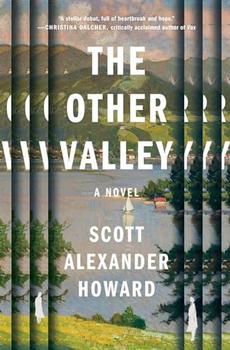Summary | Excerpt | Reviews | Beyond the Book | Readalikes | Genres & Themes | Author Bio

A Novel
by Scott Alexander HowardChapter 1
I used to stand alone by the cloakroom door. In the morning before school, and again when the lunch bell rang and the others ran out to the field, I walked to the same spot and rested my head on the sharp crags of stucco. An outcrop of shadow protected the wall from the autumn heat. With folded hands I stood in the shade, gazing at the backwoods and waiting out the day.
I took up my station at the rear of the school after Clare's parents moved downtown, leaving me friendless in the neighborhood. I sometimes ran into her at the store or on the boulevard, but as our mothers chatted, our scant talk revealed that our common ground had been only literal, the adjoining area between our yards. The new neighbors were old and seemed to wear housecoats all day. And so, at school, I became the girl by the door: Odile who stands by herself. Never spoken to and seldom spoken of. Staring at nothing with eyes like carved wood, as motionless as an effigy.
Before the bell called everyone in, I liked to slip inside the classroom a minute early. Six empty rows faced an immaculate blackboard. The dusty odor of chalk blended with a pungent oil. My teacher, M. Pichegru, habitually rubbed his desk with a wet black rag. When I was younger the oily smell had made my nostrils curl.
Then the bell would ring, the cloakroom door would open behind me, and the room would rush with noise. In the storm of laughter and gossip, I remained alone. But when Pichegru strode in with his books and his switch, everybody hushed. We stood in our uniforms until he motioned us to sit, and for the next hours of lectures and tests I was glad to have company in my silence.
That fall I was sixteen and the course of my life was ready to be determined. My class had reached the apprenticeship level, and most people were excited about the impending transition out of school. At the end of September we were to hand in our applications and wait to see who chose us; later on, once the decisions were made, we would split our time between Pichegru's lessons and training for our vocations around town. Some people knew the work they wanted, and others were scrambling to figure it out. All month there were visits scheduled from clerks and artisans explaining their trades, as well as field trips to the farms, the orchards, the mill, and the border.
That, at least, was the regular way of things. My mother, however, thought that I was destined for the Conseil. She had always believed this, or wanted to.
The Conseil's process was different from other apprenticeships. I could not simply apply at the end of the month and hope to be picked. Before that, they had a special vetting program, and gaining admittance to that program was difficult in itself. Pichegru would have to nominate me, and he could send just two students, unlike the downtown school, which got to send more. If you managed to get accepted into vetting, you had to get through September without being cut. Those who succeeded were offered apprenticeships in the Hôtel de Ville. Only a few candidates made it each year; some years no one did.
My mother worked in the Hôtel de Ville, but in the basement archives. I see the apprentices they get, she told me. They're smart, but you're smarter. She had tried out for the Conseil when she was my age and made it to the end of the second week. When I said I might be too shy for a career in politics, she scoffed.
She didn't know how I acted at school. The idea of me on the Conseil was ludicrous. I had no desire to be a conseiller, and no illusions about the likelihood of my becoming one. The prospect of competing against others mortified me, let alone the prospect of prevailing and having such a public job. But my mother's job seemed not so bad, despite her frequent gripes: filing petitions in a tucked-away room, collating reports with blacked-out names and ages. Underneath the Hôtel de Ville was somewhere I could see myself. And the fact that all such positions went to students cut from the Conseil's vetting program had helped prepare me for the shame of asking Pichegru, on the first day of school, whether he would consider nominating me. My mother had dropped me off that morning and confidently wished me luck.
Excerpted from The Other Valley by Scott Alexander Howard. Copyright © 2024 by Scott Alexander Howard. Excerpted by permission of Atria Books. All rights reserved. No part of this excerpt may be reproduced or reprinted without permission in writing from the publisher.




It is among the commonplaces of education that we often first cut off the living root and then try to replace its ...
Click Here to find out who said this, as well as discovering other famous literary quotes!
Your guide toexceptional books
BookBrowse seeks out and recommends the best in contemporary fiction and nonfiction—books that not only engage and entertain but also deepen our understanding of ourselves and the world around us.